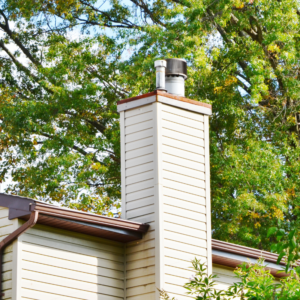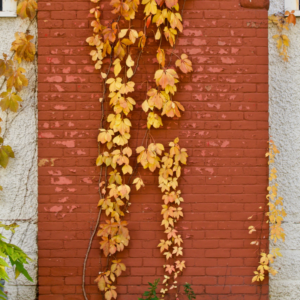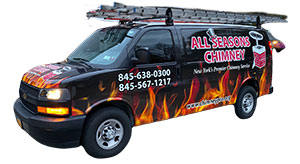Every season comes with its own changes, and with these changes come a whole new unique set of chimney odors. Unfortunately, combating these isn’t always an easy feat, and your technique may need to differ based on whether you’re actively using your system or not. That’s why we’ve created a seasonal guide to fighting and preventing chimney and fireplace odors, so you can stay ready for anything!
Need care from our qualified team of experts? We’re here for you! Give us a call today to tackle your next inspection, chimney sweeping, or repair. When you hire the crew at All Seasons Chimney, you can feel confident your system is in the best hands possible.
Preventing Spring & Summer Chimney Odors
So, with warmer weather comes rain, which can lead to some nasty odors when the water mixes with the creosote in your chimney. Creosote deposits tend to be higher right after the burning season, which makes these smells more likely in early spring. Many liken the odors to smoke or burning wood, which can be nice when you actually have a fire going, but is less than ideal when you’re trying to enjoy a fresh spring afternoon.
 Another problem comes when birds return home from the south. Their springtime goals typically consist of building nests and producing young, and your chimney is an ideal spot for doing just that. But making themselves at home means defecating in your flue and bringing in all types of debris that trigger clogs and foul odors. And if they get stuck and pass away (which happens from time to time), then things will really take a turn for the worse.
Another problem comes when birds return home from the south. Their springtime goals typically consist of building nests and producing young, and your chimney is an ideal spot for doing just that. But making themselves at home means defecating in your flue and bringing in all types of debris that trigger clogs and foul odors. And if they get stuck and pass away (which happens from time to time), then things will really take a turn for the worse.
Then, there’s the smells that come when you start turning up your air conditioning. If your home is on the tighter side (meaning it’s well-insulated), you could experience problems with your A/C pushing odors out of your chimney because there’s nowhere else for them to escape. This can lead to a campfire smell in your living space or some even note a burnt barbecue smell – not so great.
Here’s what we suggest for fighting odors in these warmer months:
- Book an Inspection: Annual inspections play a key factor in keeping your system healthier and safer for use with every burning season. These give your sweep the chance to spot anything that may be clogging (and stinking up) your flue, as well as watch for damages and excess creosote deposits, both of which make you more vulnerable to bad smells.
- Get a Sweeping Scheduled: Too much creosote buildup? This makes you more prone to chimney fires, clogs, poor airflow, and – you guessed it – foul odors. A professional sweeping will help immensely.
- Invest in a New Chimney Cap: Chimney caps are affordable, quick-to-install devices that are installed at the top of the flue, and they play a big role in protecting your flue. First and foremost, they keep out those spring rains that are known for being so harmful. They’ll also block out any animals or outdoor debris (like leaves, twigs, etc.), ensuring your system stays clear and odor-free for the long haul. Just be sure to invest in a professional installation!
- Upgrade to a Top-Sealing Damper: Like chimney caps, top-sealing dampers work great to keep out animals, debris, and any excess moisture. Sweeps consider them a big step up from the traditional throat damper, thanks to their many benefits!
- Assess Your Airflow: If your home is well-insulated, it can be hard for any bad chimney smells to effectively move up and out of your home. This especially becomes noticeable on those hot and humid days when your A/C is running strong. Give us a call and we can help you figure out ways to get your air flowing properly.
Combatting Fall & Wintertime Chimney Odors
As your fireplace starts getting put to use in the cooler fall and winter months, a whole new set of odor-related problems tends to arise. Some are consistent with spring and summer, like moisture mixing with creosote or animal entry (in which case, the same solutions apply), but you may also notice smells from your ash pile or from smoke entering your living space.
 Here’s how to combat these:
Here’s how to combat these:
- Warm the Flue: One big reason smoke enters your living space is because your chimney was too cold when you started your fire. This is another area where top-sealing dampers help out by keeping your flue warmer when not in use. That said, you can also warm the flue ahead of time to reverse airflow. Just tightly roll a newspaper, light the top, then hold it up into your chimney for a bit – good to go!
- Clear Out Your Ash: It’s true that a small layer of ash (about one or two inches) can be beneficial when starting fires during your burning season, but if that pile gets too high, you could run into some bad odors. Keep your ash levels to a minimum to prevent that ashy smell from entering your living space. (And remove them all at the end of the season.)
- Keep Your Fires Hot: Slow, smoldering fires have their benefits, but if you’re looking to ensure any fireplace smells move swiftly up and out of your chimney (and not back into your home), a hot, fast-moving fire is key. We suggest burning only well-seasoned wood to make this happen. On the plus side, this is also good for keeping creosote deposits to a minimum, too!
- Consider a Renovation: Sometimes the problem with poor draft bringing in odors has to do with the size of your chimney. It may need to be made smaller, bigger, or even taller to resolve these issues once and for all. Ask a pro for their opinion!
Ask an Expert!
Still feeling uncertain on how to tackle problems with chimney odors? Give us a call! We’d be happy to do an assessment and some troubleshooting to find the root of the issue, then offer our best advice for resolving it.
Don’t put it off – schedule an appointment with our qualified crew today!

